人教版(2019)必修第三册Unit2Morals and Virtues 语法点讲解课件(22张ppt)
文档属性
| 名称 | 人教版(2019)必修第三册Unit2Morals and Virtues 语法点讲解课件(22张ppt) | 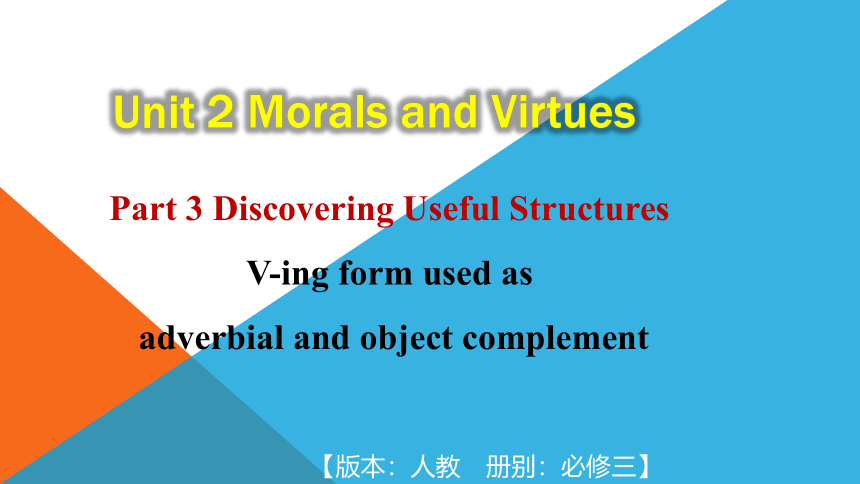 | |
| 格式 | zip | ||
| 文件大小 | 522.7KB | ||
| 资源类型 | 教案 | ||
| 版本资源 | 人教版(2019) | ||
| 科目 | 英语 | ||
| 更新时间 | 2022-04-27 09:30:45 | ||
图片预览

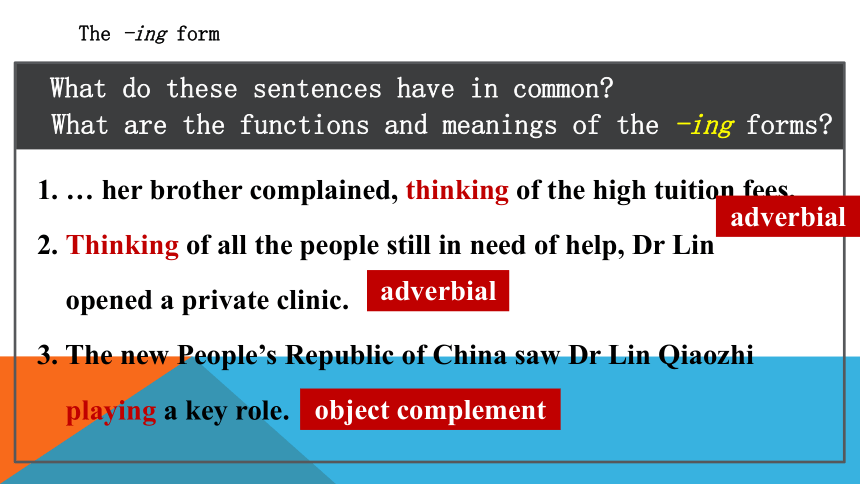
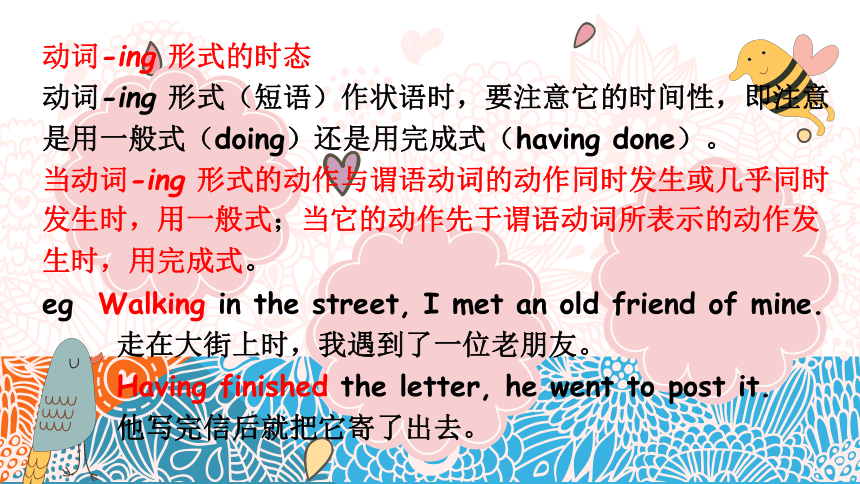
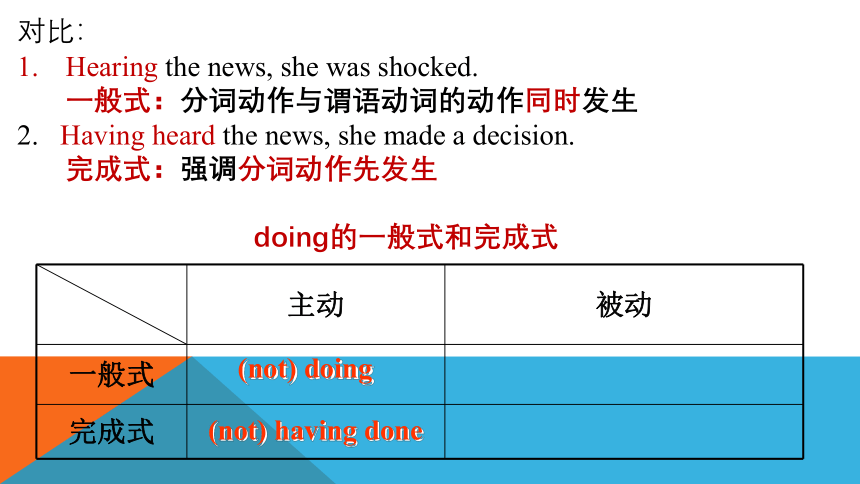
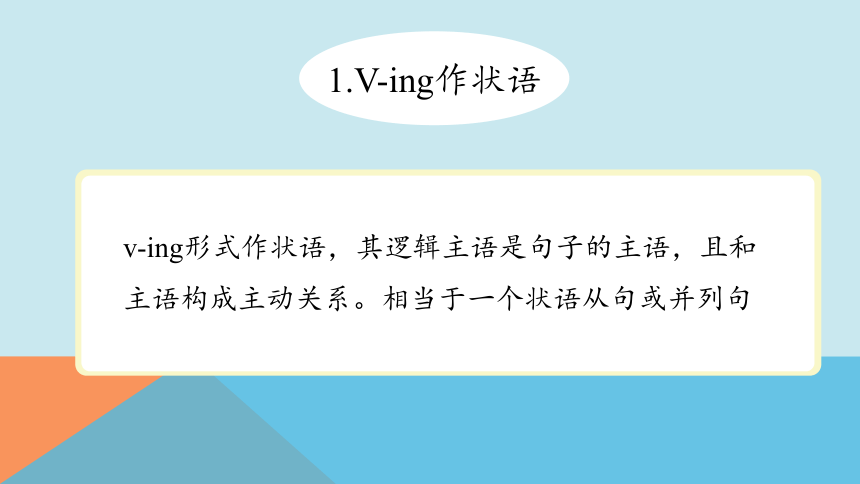
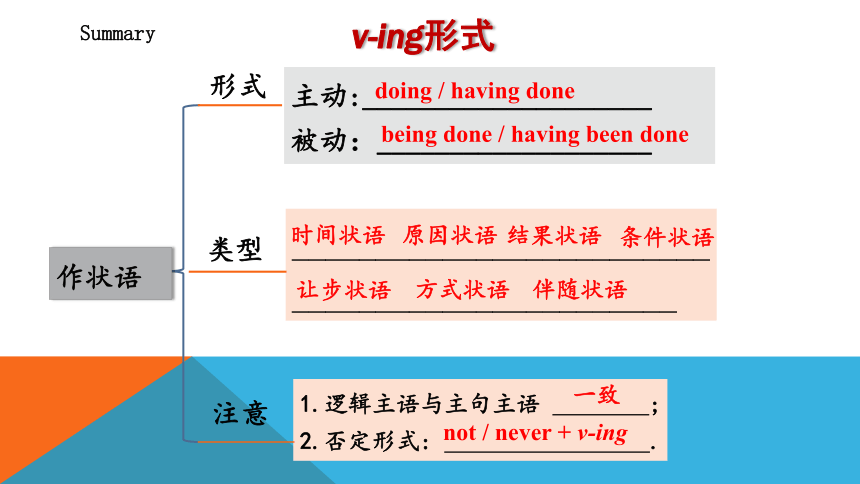
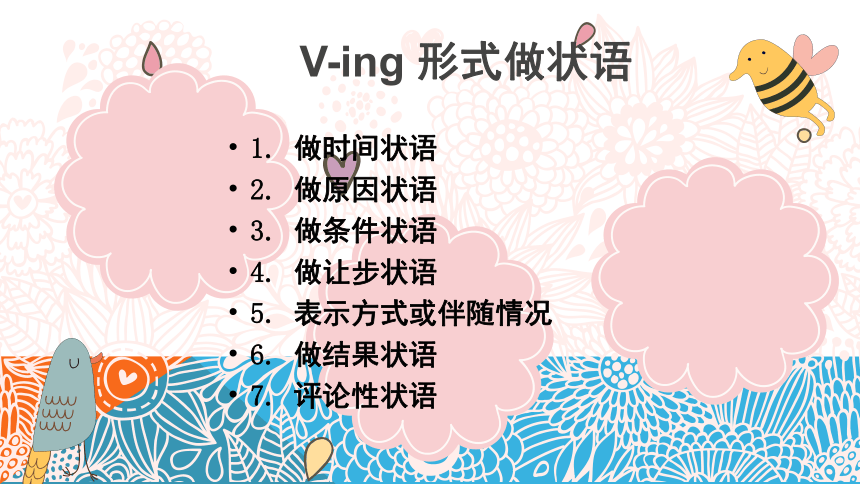
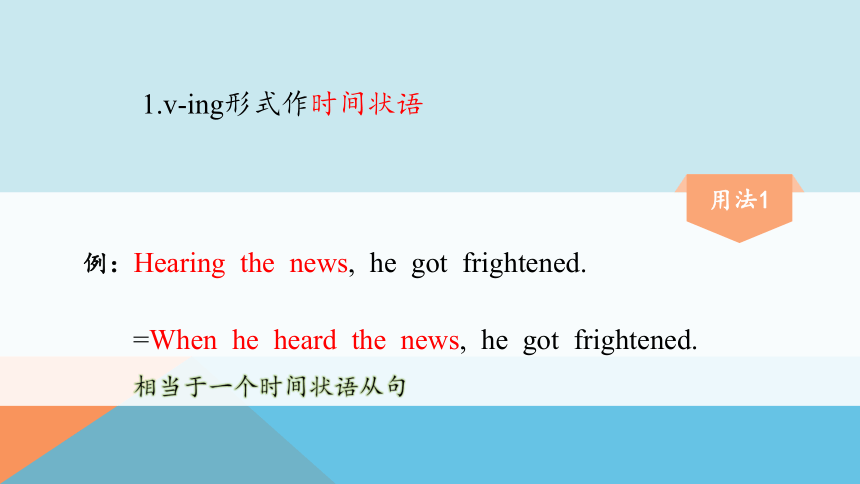
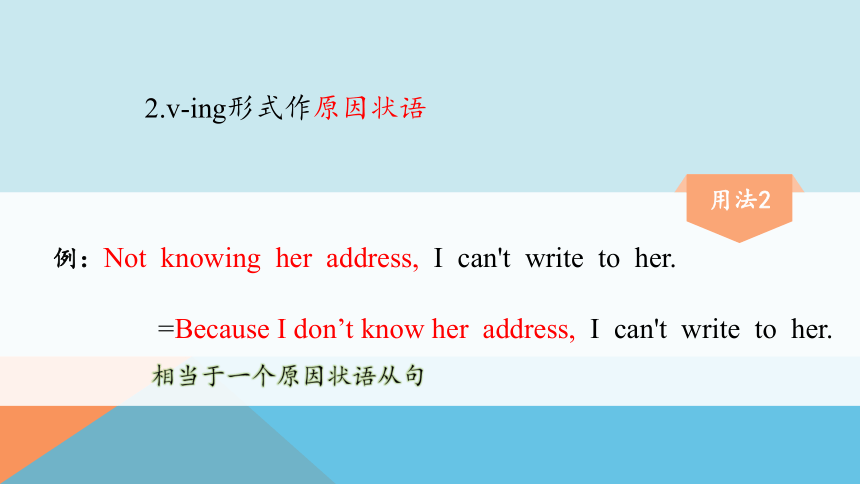
文档简介
(共22张PPT)
【版本:人教 册别:必修三】
Unit 2 Morals and Virtues
Part 3 Discovering Useful Structures
V-ing form used as
adverbial and object complement
What do these sentences have in common
What are the functions and meanings of the -ing forms
1. … her brother complained, thinking of the high tuition fees.
2. Thinking of all the people still in need of help, Dr Lin
opened a private clinic.
3. The new People’s Republic of China saw Dr Lin Qiaozhi
playing a key role.
The -ing form
adverbial
adverbial
object complement
动词-ing 形式的时态
动词-ing 形式(短语)作状语时,要注意它的时间性,即注意是用一般式(doing)还是用完成式(having done)。
当动词-ing 形式的动作与谓语动词的动作同时发生或几乎同时发生时,用一般式;当它的动作先于谓语动词所表示的动作发生时,用完成式。
eg Walking in the street, I met an old friend of mine.
走在大街上时,我遇到了一位老朋友。
Having finished the letter, he went to post it.
他写完信后就把它寄了出去。
对比:
Hearing the news, she was shocked.
2. Having heard the news, she made a decision.
主动 被动
一般式
完成式
(not) doing
(not) having done
doing的一般式和完成式
一般式:分词动作与谓语动词的动作同时发生
完成式:强调分词动作先发生
1.V-ing作状语
v-ing形式作状语,其逻辑主语是句子的主语,且和主语构成主动关系。相当于一个状语从句或并列句
v-ing形式
作状语
主动:____________________
被动:___________________
________________________________________________
1.逻辑主语与主句主语 ;
2.否定形式: .
形式
类型
注意
doing / having done
being done / having been done
时间状语
原因状语
结果状语
条件状语
让步状语
方式状语
伴随状语
一致
not / never + v-ing
Summary
V-ing 形式做状语
1. 做时间状语
2. 做原因状语
3. 做条件状语
4. 做让步状语
5. 表示方式或伴随情况
6. 做结果状语
7. 评论性状语
用法1
例:Hearing the news, he got frightened.
=When he heard the news, he got frightened.
相当于一个时间状语从句
1.v-ing形式作时间状语
用法2
例:Not knowing her address, I can't write to her.
=Because I don’t know her address, I can't write to her.
相当于一个原因状语从句
2.v-ing形式作原因状语
用法3
例:Taking the path that leads out of the town, you will come to a lake.
=If you take the path that leads out of the town, you will come to a lake. 相当于一个条件状语从句
3.v-ing形式作条件状语
用法4
例:Living miles away, he attended the course.
=Although he lived miles away, he attended the course.
相当于一个让步状语从句
4.v-ing形式作让步状语
用法5
例:They stood there for half an hour watching the stars in the sky.
.
= They stood there for half an hour and watched the stars in the sky.相当于一个并列句
5.v-ing形式作方式、伴随状语
用法6
例:The child fell off the tree, hitting his head against the ground.
=The child fell off the tree, and he hit his head against the ground.
相当于一个并列句
6.v-ing形式作结果状语
1. Hearing the news, they immediately set off for Shanghai.
2. Being tired, I stopped to have a rest.
3. The snow lasted a week, causing serious traffic confusions.
4. Working hard, you will finally succeed.
时间状语
原因状语
结果状语
条件状语
Compare and find
5. Admitting what she has said, I still think that she hasn’t tried her best.
6. Please answer the question using another way.
7. Wang Peng sat in his empty restaurant feeling frustrated.
让步状语
方式状语
伴随状语
使用v-ing形式作宾补,常表示宾语和宾补之间是主动关系或表示v-ing形式的动作正在进行。
2.V-ing作宾语补足语
作宾补
主动 ____________
被动 ____________
在_____________后作宾补
在_____________后作宾补
在_____________后作宾补
doing
being done
感官动词
使役动词
with复合结构
v-ing形式
形式
用法
用法1
感官动词(短语)see, watch, observe, look at, notice, hear, listen to, feel等后常接v-ing形式作宾补,宾语和宾补之间是主动关系。
以see为例:see +宾语+ doing sth. 看见·······正在做某事
1.感官动词+宾语+v-ing宾补
1). have +宾语+ doing sth. 使······持续做某事
2). get +宾语+ doing sth.使······开始做某事
3). keep/leave +宾语+ doing sth.使······一直做某事
用法2
例:I’m sorry to keep you waiting for so long.
2.使役动词+宾语+v-ing宾补
例:With the time passing by, he almost forgot everything in the past.
随着时间的流逝,他几乎忘记了过去所有的事情。
主动
用法3
3.with+宾语+v-ing宾补
plete the sentences with the correct forms of the verbs in the box.
feel want face smile return worry hear knock
1. __________ that his wife had been injured in an accident, Mr Johnson hurried to the hospital.
2. During the operation, she sat in the waiting room for over an hour __________ about him.
3. I saw her whispering something into his ear, obviously not _________ to be heard.
Hearing
worrying
wanting
n. 事故;车祸
n. 手术
vi. & vt. 悄声说;耳语
4. He suddenly woke up at midnight when he heard someone __________ at his door.
5. _________ higher import and export costs, the company is looking for ways to survive.
6. __________ from the North Pole, the traveller wrote a book about his experience and had it published the following year.
7. The child lay on her mother's lap, _________ sweetly.
8. ________ hurt by the rejection, she bit her lip and quietly walked away.
Facing
Returning
smiling
Feeling
feel want face smile return worry hear knock
knocking
n. 子夜;午夜
n. 进口
n. 出口
n. (行星的)极;地级
n. (坐着时的)大腿部
1. Finish the exercise about the -ing form.
2. Write a passage to introduce a person you
love and respect. The -ing forms are expected.
【版本:人教 册别:必修三】
Unit 2 Morals and Virtues
Part 3 Discovering Useful Structures
V-ing form used as
adverbial and object complement
What do these sentences have in common
What are the functions and meanings of the -ing forms
1. … her brother complained, thinking of the high tuition fees.
2. Thinking of all the people still in need of help, Dr Lin
opened a private clinic.
3. The new People’s Republic of China saw Dr Lin Qiaozhi
playing a key role.
The -ing form
adverbial
adverbial
object complement
动词-ing 形式的时态
动词-ing 形式(短语)作状语时,要注意它的时间性,即注意是用一般式(doing)还是用完成式(having done)。
当动词-ing 形式的动作与谓语动词的动作同时发生或几乎同时发生时,用一般式;当它的动作先于谓语动词所表示的动作发生时,用完成式。
eg Walking in the street, I met an old friend of mine.
走在大街上时,我遇到了一位老朋友。
Having finished the letter, he went to post it.
他写完信后就把它寄了出去。
对比:
Hearing the news, she was shocked.
2. Having heard the news, she made a decision.
主动 被动
一般式
完成式
(not) doing
(not) having done
doing的一般式和完成式
一般式:分词动作与谓语动词的动作同时发生
完成式:强调分词动作先发生
1.V-ing作状语
v-ing形式作状语,其逻辑主语是句子的主语,且和主语构成主动关系。相当于一个状语从句或并列句
v-ing形式
作状语
主动:____________________
被动:___________________
________________________________________________
1.逻辑主语与主句主语 ;
2.否定形式: .
形式
类型
注意
doing / having done
being done / having been done
时间状语
原因状语
结果状语
条件状语
让步状语
方式状语
伴随状语
一致
not / never + v-ing
Summary
V-ing 形式做状语
1. 做时间状语
2. 做原因状语
3. 做条件状语
4. 做让步状语
5. 表示方式或伴随情况
6. 做结果状语
7. 评论性状语
用法1
例:Hearing the news, he got frightened.
=When he heard the news, he got frightened.
相当于一个时间状语从句
1.v-ing形式作时间状语
用法2
例:Not knowing her address, I can't write to her.
=Because I don’t know her address, I can't write to her.
相当于一个原因状语从句
2.v-ing形式作原因状语
用法3
例:Taking the path that leads out of the town, you will come to a lake.
=If you take the path that leads out of the town, you will come to a lake. 相当于一个条件状语从句
3.v-ing形式作条件状语
用法4
例:Living miles away, he attended the course.
=Although he lived miles away, he attended the course.
相当于一个让步状语从句
4.v-ing形式作让步状语
用法5
例:They stood there for half an hour watching the stars in the sky.
.
= They stood there for half an hour and watched the stars in the sky.相当于一个并列句
5.v-ing形式作方式、伴随状语
用法6
例:The child fell off the tree, hitting his head against the ground.
=The child fell off the tree, and he hit his head against the ground.
相当于一个并列句
6.v-ing形式作结果状语
1. Hearing the news, they immediately set off for Shanghai.
2. Being tired, I stopped to have a rest.
3. The snow lasted a week, causing serious traffic confusions.
4. Working hard, you will finally succeed.
时间状语
原因状语
结果状语
条件状语
Compare and find
5. Admitting what she has said, I still think that she hasn’t tried her best.
6. Please answer the question using another way.
7. Wang Peng sat in his empty restaurant feeling frustrated.
让步状语
方式状语
伴随状语
使用v-ing形式作宾补,常表示宾语和宾补之间是主动关系或表示v-ing形式的动作正在进行。
2.V-ing作宾语补足语
作宾补
主动 ____________
被动 ____________
在_____________后作宾补
在_____________后作宾补
在_____________后作宾补
doing
being done
感官动词
使役动词
with复合结构
v-ing形式
形式
用法
用法1
感官动词(短语)see, watch, observe, look at, notice, hear, listen to, feel等后常接v-ing形式作宾补,宾语和宾补之间是主动关系。
以see为例:see +宾语+ doing sth. 看见·······正在做某事
1.感官动词+宾语+v-ing宾补
1). have +宾语+ doing sth. 使······持续做某事
2). get +宾语+ doing sth.使······开始做某事
3). keep/leave +宾语+ doing sth.使······一直做某事
用法2
例:I’m sorry to keep you waiting for so long.
2.使役动词+宾语+v-ing宾补
例:With the time passing by, he almost forgot everything in the past.
随着时间的流逝,他几乎忘记了过去所有的事情。
主动
用法3
3.with+宾语+v-ing宾补
plete the sentences with the correct forms of the verbs in the box.
feel want face smile return worry hear knock
1. __________ that his wife had been injured in an accident, Mr Johnson hurried to the hospital.
2. During the operation, she sat in the waiting room for over an hour __________ about him.
3. I saw her whispering something into his ear, obviously not _________ to be heard.
Hearing
worrying
wanting
n. 事故;车祸
n. 手术
vi. & vt. 悄声说;耳语
4. He suddenly woke up at midnight when he heard someone __________ at his door.
5. _________ higher import and export costs, the company is looking for ways to survive.
6. __________ from the North Pole, the traveller wrote a book about his experience and had it published the following year.
7. The child lay on her mother's lap, _________ sweetly.
8. ________ hurt by the rejection, she bit her lip and quietly walked away.
Facing
Returning
smiling
Feeling
feel want face smile return worry hear knock
knocking
n. 子夜;午夜
n. 进口
n. 出口
n. (行星的)极;地级
n. (坐着时的)大腿部
1. Finish the exercise about the -ing form.
2. Write a passage to introduce a person you
love and respect. The -ing forms are expected.
